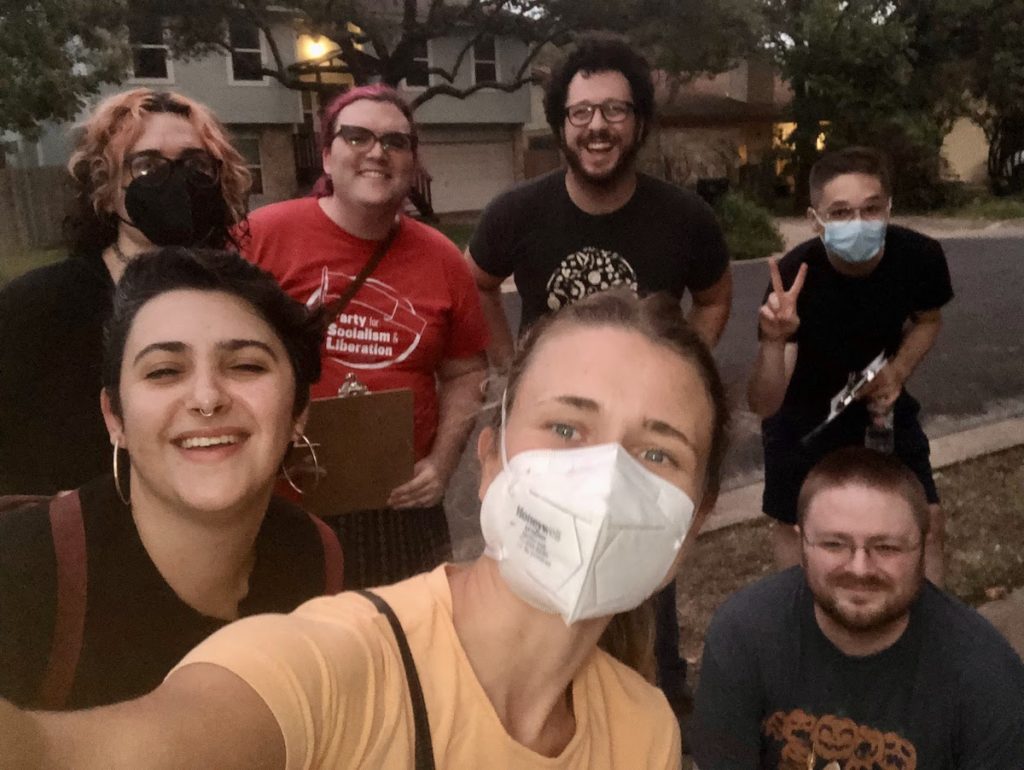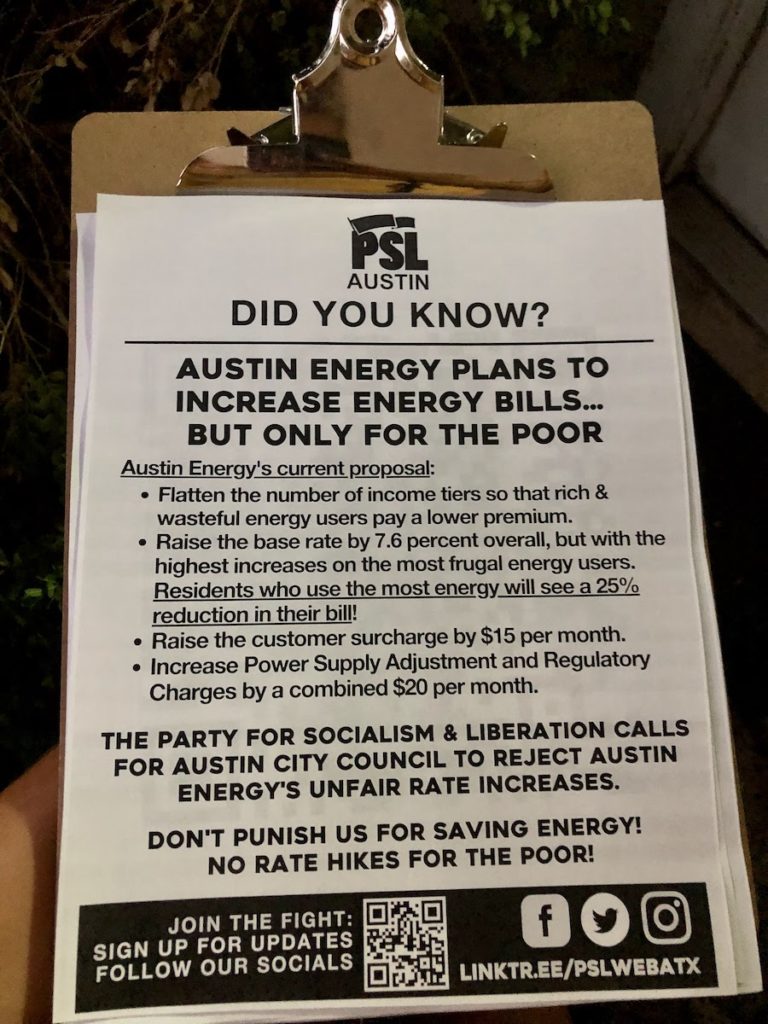Austin, Texas, residents recently defeated a proposal by Austin Energy that would have raised energy rates by 80% or more on its lowest-paying customers, while giving huge discounts to the most wasteful users and large corporations. But in a vote on Dec. 8, Austin City Council still imposed unacceptable increases onto poor residents, and the threat of energy catastrophe and price gouging still looms throughout Texas.
Austin Energy’s rate hikes are class warfare based on falsehoods
From its inception, Austin Energy’s proposal to raise its rates was a direct assault on working-class residents and a handout to large corporate interests. The first priority of activists was to cut through corporate doublespeak and expose the real nature of the proposal.
In their April base rate filing backage, AE hid its contempt for everyday customers behind bureaucratic language: “The declining average consumption keeps energy sales flat despite customer growth” due to “the housing mix becoming smaller and more efficient, and an increase in energy efficiency.” They claimed that their rate designs “rely too heavily on energy sales, particularly in the residential class.”
What AE is saying is that Austinites are using less energy as they move into smaller houses and apartments — due to rent doubling in the past year — and Austin Energy’s business model is dependent upon wasteful energy consumption for profits. What should be a good thing — more efficient energy usage — was instead seen as standing in the way of profits!
At the time of this writing, AE had five progressive tiers for energy usage, so that lower users paid lower rates than the highest users. AE sought to flatten and reduce the number of tiers, raising rates on low users — poor and working people — while lowering rates for the highest energy users. At the same time, large corporations like Tesla, like the richest AE customers, would pay less per kWh.
In AE’s twisted logic, commercial ratepayers are “subsidizing” residential ratepayers. What they are saying is that large companies are doing everyday residents a “favor” by paying on average more than a resident would. This is a slap in the face, and hides the reality that these large corporations owe their entire existence to working people.
Tesla’s factory, for instance, is “subsidized” by Austin residents in three ways. First, Tesla’s factory drained over $60 million in tax revenue from a nearby school district and the county coffers. Second, Tesla is subsidized by the exploitation of its workers through low salaries and rampant wage theft. Third, Tesla —and other large corporations — is now receiving a de facto subsidy due to the lowered energy costs for large businesses. It’s safe to say that Tesla, like all capitalist enterprises, owes every last dollar of its existence to the labor and taxes of working people.
In addition, Austin Energy claimed they needed to raise $35.7 million in new revenues. The Independent Consumer Advocate, hired by the city to advocate “on behalf of” Austin residents, found that AE only needed to raise $6.5 million. Not only were the rate hikes disproportionately targeting the poor while giving money to the rich, they were based on completely fictitious numbers.
Concessions won through popular struggle and unanimous pushback
As AE’s proposal was shaping up for a council vote, a broad coalition of unions, environmentalists, Latino activists, community groups, and socialists sprung into action. The proposal was so offensive — not just hurting working people, but actively punishing energy conservation — that many groups found common cause in the fight.
On Sept. 24, Texas Climate Jobs Action held a rally at AE’s headquarters with Sierra Club Lone Star Chapter, Sunrise Austin, and PODER (People Organized in Defense of Earth and Her Resources). Kaiba White of Public Citizen, which intervened and participated in negotiations, points out that the proposal “is in direct conflict with all of the goals that Austin City Council has adopted, that in the past AE has even been supportive of.”
Party for Socialism and Liberation – Austin joined the struggle immediately after the rally with the following goals: 1) to expose the true nature of the rate hike as a deliberate act of class warfare; 2) to engage the working class in direct struggle against the system.
At the time, local media was reporting on the rate hikes as a “done deal.” In a typical article from November, NPR affiliate KUT all but assumes the rate hike will pass, only mentioning that Austinites can challenge the proposal at the very end of the article. If we wanted to stop the rate hikes, we needed to challenge the media narrative that rate hikes were inevitable and nothing could be done to stop them.
PSL members canvassed week after week in working-class areas of the city with a clear and concise message:
- Austin Energy is raising rates on the poor, while giving the rich and corporations a huge discount!
- This isn’t settled yet; City Council still needs to vote on it.
- To stop the rate hikes, we need everyone to speak out when City Council votes.

Throughout October and November, organizers with PSL, CPUSA, and Sunrise Movement canvassed with this message. Organizers produced a rate hike calculator so that people could see exactly how much their energy rates would be raised if AE had its way. Along with the calculator, they asked for people’s input on how the proposal would affect them.
One respondent said that with the rate hike, “I couldn’t afford to use my electricity at all. Scary because we’re older and on Medicare.” Others reported that their rates would be raised by 70.77% and 79%, and another person commented, “Truly the energy goal for [the] city should be moving to wind and solar and hydro, not giving rich people and corporations discounts!”
As the City Council vote loomed, PSL organizers moved toward mobilizing people to speak at City Hall. On the first possible voting date, November 15, City Council was met with small but unanimous dissent against the proposal. They were unable to come to an agreement and kicked the discussion back.
On December 1, City Council met again to vote on the rate hike with no alternative proposal in place. Over 20 people registered to speak on the rate hike, with every single person present demanding City Council reject it entirely.
One week later, City Council finally voted on a “compromise” proposal. The majority of Council, representing the business interests of large corporations, took Austin Energy’s demand for tens of millions of extra dollars at face value.

The final proposal as forced through by Mayor Steve Adler and council member Leslie Pool, among others, is still a slap in the face to working Austinites. Residents will see an average increase of $9 per month starting in 2023. City Council included small year-to-year increases until 2025 to avoid “rate shock,” which means they hope to slowly ratchet up the prices to obscene levels without “shocking” people into noticing and fighting back.
Any rate increase is unacceptable, but the full extent of the rate increases wanted by AE was stopped by the overwhelming and unanimous turnout of everyday people against the hike.
Where do we go from here?
While the community stopped the worst of the rate hikes, at best, this victory will slow the bleeding that working-class Austinites are experiencing. We need more than a slower rate of increase in energy rates: We need a complete system overhaul.
Everyone organizers spoke to had issues with Austin Energy, its reliability and its prices. But the solution has been less clear. Some people have concerns that Austin Energy is a monopoly, and think it needs to be broken up or introduced to competition. Others have voiced concerns that Austin Energy is a “public” utility, and needs to be privatized to be more efficient.
Neither of these is true. In the rest of Texas, where the “free market” reigns, energy is just as unreliable and usually more expensive. In areas where the main power companies are privatized, the CEOs are free to raise prices at any time without any input from the public. And they do! In fact, Austin Energy’s “public” status was what allowed us to fight the hike in the first place.
The problem is not “monopolies” versus “competition,” or “public” utilities being less efficient. The problem is capitalism: a system where the “right” of companies to make a profit is considered more important than the right of all people to a roof over their heads, food to eat and power to their homes.
All across the United States, energy prices are rising. Instead of switching to renewable energy such as wind and solar, power companies are continuing to rely on unreliable fossil fuels which are destroying the planet and driving prices up. Why? Because literally burning through your fuel supply gives you the ability to continue charging for new fuel, creating profits for wealthy energy corporations. Even where there are “public” utilities such as Austin, these “public” entities are controlled from above by capitalist politicians with corrupt business interests.
There is only one solution: Take both the private and “public” utilities, put them under truly public control and fire the profit-minded CEOs at the top of these companies. Let the important decisions be made by cooperative teams of engineers and scientists who know how the system works, together with workers, environmental groups, and Black and Brown communities who are directly impacted by environmental racism. These utilities should operate under the principle that energy is a human right, and no person should have their ability to heat their homes in winter or cook their food shut off, ever.
The solution, in short, is socialism!



